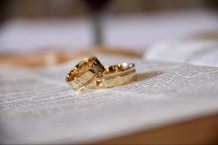articles

Online weddings are being held in other countries and there have been some non-legally binding ceremonies in the UK.
Video link weddings should be allowed to help the desperately ill during the coronavirus pandemic, expert recommends
Weddings via video link should be allowed for those desperately ill during the coronavirus pandemic, according to a leading marriage-law expert.
The law already allows people to marry quickly, and in a number of different locations, if one of the couple is terminally ill, but these existing rules do not address the current situation where people have to socially distance, Professor Rebecca Probert from the University of Exeter Law School has said.
Weddings are not currently banned, but Government restrictions mean in practice it is not possible for them to take place. Places of worship are only allowed to hold funerals, or to broadcast an act of workshop. Most other premises approved for weddings have also had to close. Restrictions on movement and gatherings also make weddings harder to host.
Professor Probert proposes that the law should be changed to allow people to marry online, with the person conducting the ceremony, the couple, and their witnesses in different locations as necessary.
Online weddings are being held in other countries and there have been some non-legally binding ceremonies in the UK.
Professor Probert said: “In order to facilitate deathbed weddings during this emergency period, it should be possible for weddings to be authorised speedily, by notice being given online, for the ceremony itself to take place with the couple and any other persons whose presence is required communicating by video link, for the number of persons whose presence is required to be limited as far as possible, and for a document to be signed electronically as evidence that the wedding has taken place.”
“Many couples will have had their hopes and dreams shattered. In these circumstances, the state should use all of the tools at its disposal to grant what may be one of the couple’s dying wish.”
The Anglican Church can already provide a special licence which allows a marriage to go ahead without any waiting period, at any time, and in any location, although subject to fairly exacting criteria established by the Archbishop of Canterbury. These special licences can now be applied for online, with couples able to submit documents electronically.
Civil weddings and weddings according to other religious rites can be authorised by a Registrar General’s licence, given by local authorities, in certain narrowly defined circumstances. Some councils have said they are not issuing Registrar General’s licences, while others have said requests would need to be risk-assessed and would be considered on a case-by-case basis. Professor Probert recommends local authorities should create an application for these licences modelled much more closely on that for special licences. Applications could be conducted electronically and interviews with couples carried out by video link.
Currently two registration officials have to be present at every civil wedding, and Professor Probert says that the law should be changed to reduce this to one. For religious weddings any person who is authorised to register a marriage in a registered place of worship should be able to register a deathbed marriage in place of the registrar.
Those whose presence is required should not be put at risk. Conducting a wedding by videoconferencing would allow them to see each other, and ensure that each of the couple are genuinely consenting to marry.
Professor Probert also recommends a new electronic document to be signed as evidence that the wedding has taken place.
Date: 14 May 2020
